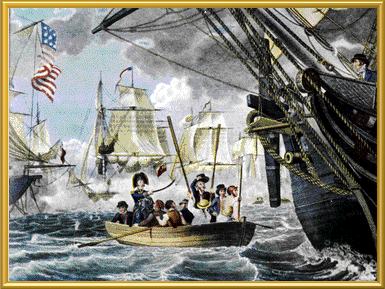

In time, France came to dominate much of the continent of Europe, while Britain remained supreme on the seas. The two powers also fought each other commercially: Britain attempted to blockade the continent of Europe, and France tried to prevent the sale of British goods in French possessions. During the 1790s, French and British maritime policies produced several crises with the United States, but after 1803 the difficulties became much more serious. The British Orders in Council of 1807 tried to channel all neutral trade to continental Europe through Great Britain, and France's Berlin and Milan decrees of 1806 and 1807 declared Britain in a state of blockade and condemned neutral shipping that obeyed British regulations (see CONTINENTAL SYSTEM). The United States believed its rights on the seas as a neutral were being violated by both nations, but British maritime policies were resented more because Britain dominated the seas. Also, the British claimed the right to take from American merchant ships any British sailors who were serving on them. Frequently, they also took Americans. This practice of impressment became a major grievance.
The United States at first attempted to change the policies of the European powers by economic means. In 1807, after the British ship Leopard fired on the American frigate CHESAPEAKE, President Thomas Jefferson urged and Congress passed an EMBARGO ACT banning all American ships from foreign trade. The embargo failed to change British and French policies but devastated New England shipping. Later and weaker economic measures were also unsuccessful.
Failing in peaceful efforts and facing an economic depression, some Americansbegan to argue for a declaration of war to redeem the national honor. The Congress that was elected in 1810 and met in November 1811 included a group known as the War Hawks who demanded war against Great Britain. These men were all Democratic-Republicans and mostly from the West and South. Among their leaders were John C. Calhoun of South Carolina, Henry Clay of Kentucky, and Felix Grundy of Tennessee. They argued that American honor could be saved and British policies changed by an invasion of Canada. The FEDERALIST PARTY, representing New England shippers who foresaw the ruination of their trade, opposed war.
Napoleon's announcement in 1810 of the revocation of his decrees was followed by British refusals to repeal their orders, and pressures for war increased. On June 18, 1812, President James MADISON signed a declaration of war that Congress--with substantial opposition--had passed at his request. Unknown to Americans, Britain had finally, two days earlier, announced that it would revoke its orders.